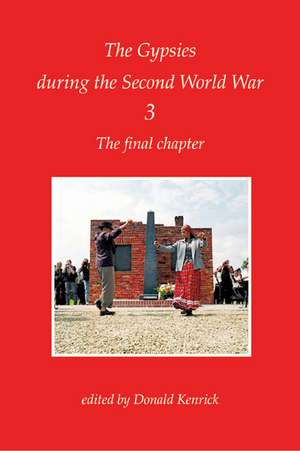The Gypsies During the Second World War: Volume 3; The Final Chapter: Interface Collection
Autor Donald Kenricken Limba Engleză Paperback – 12 iul 2006
The concluding part of an important three-volume series examining the persecution of the Gypsy people during the Second World War. Volume 3 deals with the fates of those in countries not yet explored, including Hungary, Slovakia, Switzerland, Yugoslavia and the former Soviet Union. The measures against the Gypsies in Norway are also dealt with.
The second part of the book gives an overview of what happened after 1945 reparations, the post-war trials of the perpetrators and considers the intertwined fates of the Jews and the Gypsies. How the Holocaust is researched and written about by historians (including Holocaust denial) is also discussed and a postscript looks at the uncertain future of the Roma in the Europe of today.
Contributors include Henriette Asso, Milena Hbschmannov, Thomas Huonker, Valdemar Kalinin, Katalin Katz, and Michael Zimmermann.
Like the previous two volumes, this work includes a glossary and bibliography and is illustrated throughout with rare photographs and documents.
(Volume 1 focuses on Nazi anti-Gypsy policies and their background, principles and effects: internment, deportation and extermination. It describes how German policies of Gypsy persecution from 1875 onwards led to the establishment of the Race Hygiene Research Centre in 1936 which delivered the justification for the proposed destruction of the Gypsies. The origins of internment camps and the development of the death camps at Buchenwald, Ravensbruck and Auschwitz are explained.
Volume 2 deals with the persecution of the Romanis and Sinti in some of the countries occupied by Germany and its fascist allies: France, Italy, the Austrian Burgenland, Bulgaria, the Czech lands, Romania, the Soviet Union and the Baltic States.)
The second part of the book gives an overview of what happened after 1945 reparations, the post-war trials of the perpetrators and considers the intertwined fates of the Jews and the Gypsies. How the Holocaust is researched and written about by historians (including Holocaust denial) is also discussed and a postscript looks at the uncertain future of the Roma in the Europe of today.
Contributors include Henriette Asso, Milena Hbschmannov, Thomas Huonker, Valdemar Kalinin, Katalin Katz, and Michael Zimmermann.
Like the previous two volumes, this work includes a glossary and bibliography and is illustrated throughout with rare photographs and documents.
(Volume 1 focuses on Nazi anti-Gypsy policies and their background, principles and effects: internment, deportation and extermination. It describes how German policies of Gypsy persecution from 1875 onwards led to the establishment of the Race Hygiene Research Centre in 1936 which delivered the justification for the proposed destruction of the Gypsies. The origins of internment camps and the development of the death camps at Buchenwald, Ravensbruck and Auschwitz are explained.
Volume 2 deals with the persecution of the Romanis and Sinti in some of the countries occupied by Germany and its fascist allies: France, Italy, the Austrian Burgenland, Bulgaria, the Czech lands, Romania, the Soviet Union and the Baltic States.)
Preț: 119.16 lei
Nou
Puncte Express: 179
Preț estimativ în valută:
22.80€ • 23.72$ • 18.83£
22.80€ • 23.72$ • 18.83£
Carte indisponibilă temporar
Doresc să fiu notificat când acest titlu va fi disponibil:
Se trimite...
Preluare comenzi: 021 569.72.76
Specificații
ISBN-13: 9781902806495
ISBN-10: 1902806492
Pagini: 264
Ilustrații: ill
Dimensiuni: 161 x 230 x 20 mm
Greutate: 0.5 kg
Ediția:annotated ed.
Editura: University of Hertfordshire Press
Seria Interface Collection
Locul publicării:United Kingdom
ISBN-10: 1902806492
Pagini: 264
Ilustrații: ill
Dimensiuni: 161 x 230 x 20 mm
Greutate: 0.5 kg
Ediția:annotated ed.
Editura: University of Hertfordshire Press
Seria Interface Collection
Locul publicării:United Kingdom
Notă biografică
Donald Kenrick is the author of Historical Dictionary of the Gypsies (Romanies) and co-author of Moving On: The Gypsies and Travellers of Britain, and the first full-length study on the Romani Holocaust. He also served as first secretary of the World Romany Congress Languages Commission.


